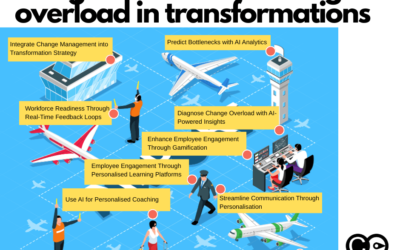Research on aversion to loss can explain why people don’t want to change. I spoke with Senior Fellow, anthropologist and ex-Inteller Tony Salvador.
It sounds completely illogical but true ….
This plays out in various facets of how people make decisions about choices … including in a change transformations context.
This is just one of the many things I spoke with Tony Salvador about.
Change aversion is a powerful psychological concept rooted in loss aversion, where individuals tend to fear losing what they have more than they value gaining something of equal magnitude. This phenomenon plays a significant role in why many people resist new changes, whether in their personal lives or within organizations, and particularly affects how product managers, leaders, and customer-facing teams approach change initiatives. It impacts their decision-making processes heavily, especially when they perceive potential losses that could overshadow a gain of equal magnitude.
At the individual level, the degree of change aversion varies depending on personal circumstances and perceptions. Original research grounded in Prospect Theory explains that people evaluate potential changes not just by the prospective benefits but by the risks of losing familiar routines, status, or comfort. For example, individuals are often more concerned about losing $2 than they are motivated by the prospect of gaining $5, because the psychological impact of loss outweighs that of an equivalent gain. This loss aversion creates an emotional barrier that can prevent even well-intentioned changes from being embraced.
The effects of change aversion can be observed in many contexts, including business transformations and customer satisfaction. For product managers, understanding this aversion is crucial when introducing new features or product updates. Despite best intentions customers might resist changes that disrupt their habitual usage or create uncertainty – even when these changes offer clear improvements or potential benefits. This reluctance can negatively impact customer feedback and satisfaction because the change is perceived as a threat rather than an opportunity, despite significant change efforts.
One helpful point of reference for managing change aversion is recognizing that the degree of aversion is not uniform. Organizational change studies show that people feel more averse to changes imposed upon them (such as being assigned new tasks) than to changes they self-initiate (like managing their own time differently). This highlights the importance of agency in the change process. When employees or customers feel involved or have some control, their resistance diminishes.
The potential benefits of understanding and addressing change aversion are profound. Company leaders who communicate transparently about what changes mean, acknowledge possible losses, and provide support and resources can create an environment where people feel safer to engage with change. This approach can be extended to personal lives, for example, in maintaining new year’s resolutions where individuals face their own internal resistance rooted in loss aversion to giving up old habits or comforts.
Moreover, energetic speeches or inspirational messaging via emails can sometimes fail to overcome change aversion if they neglect the underlying psychological resistance. Instead, effective change management embraces empathy and addresses the emotional loss individuals perceive. This understanding is particularly vital for product managers relying on customer feedback to refine changes, as they must balance the introduction of innovation with the human tendency to resist disruption.
In summary, loss aversion explains why change feels threatening and why resistance often arises despite good intentions and clear advantages of the new change. By acknowledging the psychological concept of change aversion and its individual variability, organizations and individuals can better design, communicate, and implement changes that minimize resistance and maximize acceptance and satisfaction.
This nuanced understanding provides a valuable toolkit for navigating change in both organizational settings and personal lives, helping transform resistance into openness and enabling progress despite the natural human tendency toward aversion to loss.
Lots of golden nuggets of wisdom takeaways for change practitioners from the man who spent 30+ years working for Intel researching about people behaviour and how they operate in social and technological environments.
Stay tuned for the full recording.
Why do people oppose change?
People often oppose change due to change aversion, a psychological tendency where individuals fear losing what they already possess. This resistance is rooted in the discomfort of uncertainty and potential negative outcomes. Understanding this can help leaders implement strategies to ease transitions and foster acceptance within teams.





